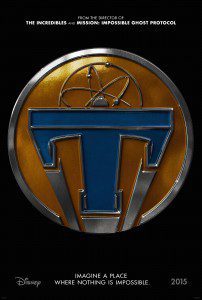 It’ll be a big year for the Mouse House.
It’ll be a big year for the Mouse House.
Avengers: Age of Ultron is the year’s highest-grossing movie so far, having already made around $438 million domestically for its parent company, Disney. Its main competition to become the year’s biggest money-maker? Star Wars VII: The Force Awakens—also owned by Disney. Cinderella, the studio’s latest live-action re-imagining of one of its classic movies, has made nearly $200 million in its own right. Pixar, Disney’s powerhouse daughter company, is set to release two films this year—Inside Out on June 19 and The Good Dinosaur Nov. 25—and the last time a Pixar flick failed to earn at least $180 million stateside was with A Bug’s Life way back in 1998.
But in the midst of all these home runs, Disney has hit one soft single: Tomorrowland.
I hardly ever watch movies a second time in theaters, but I just got back from a second viewing of Tomorrowland, which means that Disney can add another few bucks to the movie’s $76.2 million gross so far. It won’t help the movie’s bottom line much, given that Disney spent about $190 million to make the thing.
In the movie, teen Casey Newton (Britt Robertson) is given a glimpse of an extra-dimensional world where all the world’s greatest scientists and dreamers are hard at work building a better tomorrow. But when she gets there—with the help of cantankerous Frank Walker (George Clooney) and go-get-em robot Athena (Raffey Cassidy), she finds even this optimistic world has lost hope in the future. And worse, it’s spreading that pessimism to the wider world, making its dire vision a self-fulfilling prophecy.
I liked this movie. I found it fun and hopeful and, frankly, inspiring. And I sketched out some “Watching God”-like thoughts over on Plugged In’s blog after the movie came out. But most secular critics have been less kind. It holds a 49 percent “freshness” rating from Rotten Tomatoes, with reviewers bothered by its liberal environmentalism or its conservative Ayn Rand-ism or its alleged lack of artsy-ism.
It’s ironic: Tomorrowland tells us that we’ve fallen so in love with dystopian visions of the future that we’ve rejected the hope and promise of a better tomorrow. Whether that’s true or not, it seems moviegoers have at least rejected a hopeful, optimistic movie about the future.
 But optimism has always been a hard sell. As my wife and I were driving home from Tomorrowland last night, I tried to think of other science fiction movies that offered a hopeful view of the future. I couldn’t think of a one. When I asked Google to find me some good “Utopian movies,” the sites it suggested listed such films as Metropolis, Forbidden Planet, Blade Runner and The Matrix. Utopia? Hardly. Given those choices, I’m surprised the latest Mad Max movie wasn’t listed as a feel-good charmer.
But optimism has always been a hard sell. As my wife and I were driving home from Tomorrowland last night, I tried to think of other science fiction movies that offered a hopeful view of the future. I couldn’t think of a one. When I asked Google to find me some good “Utopian movies,” the sites it suggested listed such films as Metropolis, Forbidden Planet, Blade Runner and The Matrix. Utopia? Hardly. Given those choices, I’m surprised the latest Mad Max movie wasn’t listed as a feel-good charmer.
“In every moment there’s a possibility of a better future, but you people won’t believe it,” Governor Nix, Tomorrowland’s villain, tells us. And I think there’s truth in that. For all the wonders that science and technology have given us, we’re deeply suspicious of it. Even in Tomorrowland’s shiny new world, we see such a creation—a machine that knows the future and says that there is none. We’re destined for disaster. For such an optimistic movie, Tomorrowland can look pretty dark at times.
And yet in Tomorrowland—and really, in nearly every dystopian movie out there—we still find hope. A Freder or Commander Adams. A Neo or a Mad Max. We understand that even when the world seems like a black, cold, place, we find a little spark somewhere. A little heat. A little hope.
We see faith in Tomorrowland’s Casey—a determination not to accept the fatalistic future handed to her.
The world can feel pretty dystopian when we read the Bible, too. It’s a bad place that gets worse all the time. Technology almost always backfires in its stories, just as it does in ours: The Tower of Babel didn’t work out any better than the machines in Metropolis or the massive broadcaster in Tomorrowland. Most of the Bible’s heroes lived in a world that, to us, would look quite dystopian indeed. And we won’t even get into what we read about in Revelations.
But even so, the Bible insists there is help for us. There is hope.
“All things are possible for one who believes,” Jesus says in Mark. And we see that borne out in our stories. About every dystopian hero we have believed when there was no reason to. They held out hope when all was hopeless. That’s a big part of what faith is.












